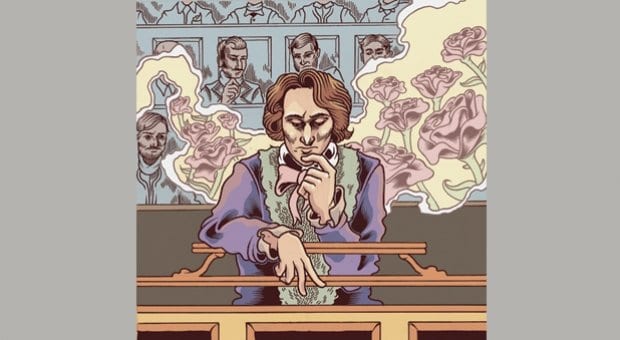I’m sentimental to the point that I anthropomorphize many of my possessions; I had an African violet named Planty, my old desktop computer was called Computy, and my printer is (somewhat more imaginatively) called Hennimore — because when it malfunctions it’s satisfying to yell, “Hennimore!” So my ears pricked up when I read that Reading Prison — where Oscar Wilde was incarcerated — is scheduled for closure by the end of 2013.
In 1891, Wilde began an affair with the young Lord Alfred “Bosie” Douglas, a relationship that would eventually result in Wilde’s imprisonment. Bosie’s father was the eccentric, cruel and probably mentally unbalanced John Sholto Douglas, The Marquess of Queensberry. He was concerned about his son’s relationship with “this man Wilde” but was temporarily appeased when Wilde charmed him at a lunch at the Café Royal in London. However, by 1894 Queensberry was convinced Wilde was a dangerous homosexual.
Queensberry took increasingly drastic steps to end his son’s relationship with Wilde. His attempt to disrupt the opening night of Wilde’s play The Importance of Being Earnest was stymied, and four days later he went to the Albemarle Club, where Wilde was a member, and left a card addressed to “Oscar Wilde posing somdomite [sic].”
At Bosie’s urging, Wilde decided to sue the Marquess for libel. Wilde’s grandson, Merlin Holland, has written a fantastic book about Wilde’s trials, called Irish Peacock & Scarlet Marquess. Bosie seemed unconcerned about what might happen to Wilde; in the foreword to Holland’s book, Sir John Mortimer writes that Bosie pushed Wilde into the suit because he “longed for a fight to the death against his savage and eccentric father.”
For me, Wilde’s image as being impeccably clever faltered when I first read an analysis of the trials; anyone could see that the libel suit was going to result in disaster for Wilde. The reason is that the main defence against libel is to show that the allegations you made are true, so when Wilde took Queensberry to court, it meant forcing him to prove that Wilde was a homosexual. All this evidence could then be turned over to the government, leaving Wilde open to prosecution for “gross indecency.” And that’s exactly what happened.
During the trial, Wilde dealt reasonably well with the “proofs” offered by the Marquess’s lawyer, Edward Carson, but things looked grim when it became clear Carson was about to call up many of the young men Wilde had slept with. Wilde’s lawyer eventually had some success convincing Wilde to drop the suit, but by then it was too late: Carson had already given all his evidence to the government. Two criminal trials followed, with Wilde as the accused. The most memorable moment of the first criminal trial was Wilde’s touching speech (which always makes me cry) about “the love that dare not speak its name.” Wilde was convicted of “gross indecency” in 1895 and sentenced to two years’ hard labour.
While incarcerated at Reading Prison, Wilde wrote the epistle De Profundis (Latin for “from the depths”). It analyzed what had happened to Wilde in the years leading up to his incarceration and blamed his own weakness and Bosie’s vanity for Wilde’s imprisonment. After his release from prison, Wilde wrote The Ballad of Reading Gaol. It was published originally under the pseudonym C33 (Block C, Landing 3, Cell 3), which hinted at Wilde’s identity by indicating where he had been housed.
Since 1992, Reading Prison has been a centre for young offenders, aged 18 to 21. The British government is closing the prison as part of a plan to replace a number of older prisons with a super-prison in North Wales. The Oscar Wilde Society, a group founded in 1990 during a gathering in the Queensberry Room at the Café Royal (where Wilde charmed the Marquess and often entertained other guests), would like the prison to be maintained as a tourist attraction. I don’t know how feasible it is to preserve a dilapidated Victorian prison just for the sake of the brief time Wilde spent there, but the thought of losing the site forever upsets my sentimental side. Perhaps it should be maintained and, according to my clever nicknaming scheme, be called “Wildey Prisony.”
(History Boys appears on Daily Xtra on the first and third Tuesday of every month. You can
also follow them on Facebook.)


 Why you can trust Xtra
Why you can trust Xtra


